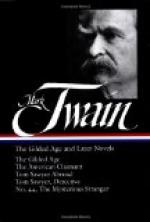“I don’t know. I saved his clothes—it was all I could do. I am afraid he lost his life.”
“Well, you must have found twenty or thirty thousand dollars in those clothes, in money or certificates of deposit.”
“No, I found only five hundred and a trifle. I borrowed the trifle and banked the five hundred.”
“What’ll we do about it?”
“Return it to the owner.”
“It’s easy said, but not easy to manage. Let’s leave it alone till we get Sellers’s advice. And that reminds me. I’ve got to run and meet Sellers and explain who you are not and who you are, or he’ll come thundering in here to stop his daughter from marrying a phantom. But— suppose your father came over here to break off the match?”
“Well, isn’t he down stairs getting acquainted with Sally? That’s all safe.”
So Hawkins departed to meet and prepare the Sellerses.
Rossmore Towers saw great times and late hours during the succeeding week. The two earls were such opposites in nature that they fraternized at once. Sellers said privately that Rossmore was the most extraordinary character he had ever met—a man just made out of the condensed milk of human kindness, yet with the ability to totally hide the fact from any but the most practised character-reader; a man whose whole being was sweetness, patience and charity, yet with a cunning so profound, an ability so marvelous in the acting of a double part, that many a person of considerable intelligence might live with him for centuries and never suspect the presence in him of these characteristics.
Finally there was a quiet wedding at the Towers, instead of a big one at the British embassy, with the militia and the fire brigades and the temperance organizations on hand in torchlight procession, as at first proposed by one of the earls. The art-firm and Barrow were present at the wedding, and the tinner and Puss had been invited, but the tinner was ill and Puss was nursing him—for they were engaged.
The Sellerses were to go to England with their new allies for a brief visit, but when it was time to take the train from Washington, the colonel was missing.
Hawkins was going as far as New York with the party, and said he would explain the matter on the road.
The explanation was in a letter left by the colonel in Hawkins’s hands. In it he promised to join Mrs. Sellers later, in England, and then went on to say:
The truth is, my dear Hawkins, a mighty idea has been born to me within the hour, and I must not even stop to say goodbye to my dear ones. A man’s highest duty takes precedence of all minor ones, and must be attended to with his best promptness and energy, at whatsoever cost to his affections or his convenience. And first of all a man’s duties is his duty to his own honor—he must keep that spotless. Mine is threatened. When I was feeling sure of my imminent future solidity, I forwarded to the




